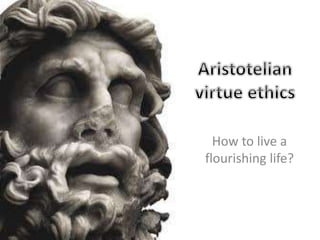Aristotle happiness slideshare_simple
- 1. How to live a flourishing life?
- 2. Aristotelian philosophy and the place of virtue ethics in it • Aristotle attempts to identify what are the characteristics of human being that differentiate it from other species. • Every species has its own role in the universe. • It is the fulfilling its role well that defines what is the ultimate good of that thing or animal.
- 3. Happiness • When one does what one is supposed to do, one feels fulfillment. • In other words, when one is what one is supposed to be, one is happy. • Happiness / satisfaction is considered to be a good thing. • In fact happiness is the ONLY really good thing in the sense that we don’t want it for the sake of another thing (as a tool) but for its own sake. • Happiness is an indicator of life lived correctly i.e. virtuous alignment with nature.
- 4. The animal called ”human being” • There are natural criteria for judging whether the act is leads to happiness (eudaimonia) to misery • These criteria are defined by what the human being (as a species) is. • By observing, what makes human being happy (eudaimonia) and what make him suffer, one can find out what kind of acts are virtuous.




